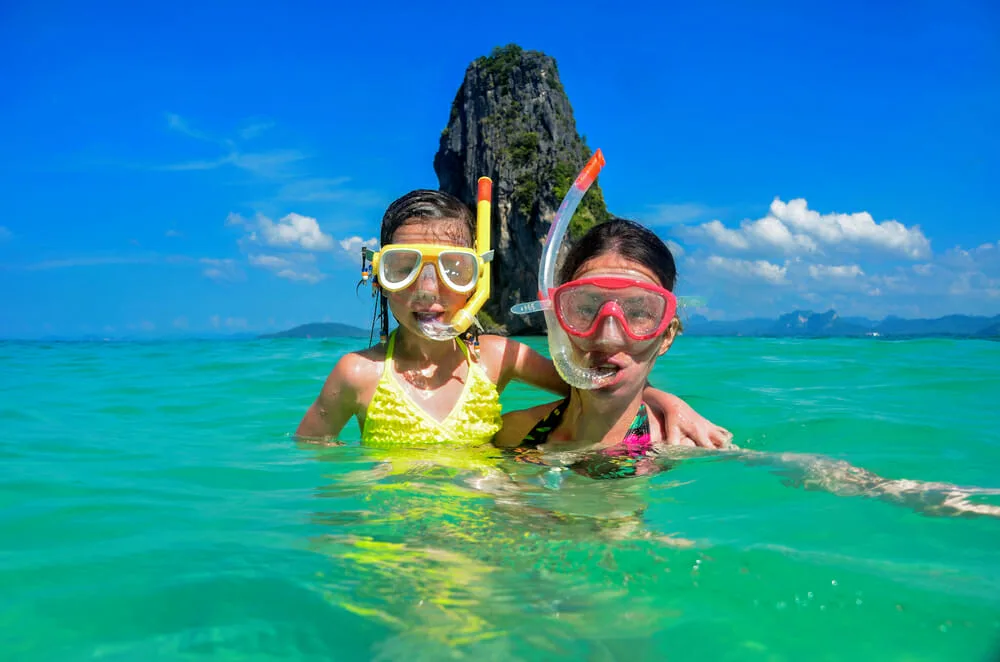Phi Phi Island, known for its stunning beaches and vibrant nightlife, attracts travelers worldwide. While the island is generally safe, there are several safety concerns and tips to consider to ensure a safe and enjoyable trip. Here’s a comprehensive guide to staying safe while visiting Phi Phi Island.
Essential Safety Tips for Visiting Phi Phi Island
1. Understanding Water Safety on Phi Phi Island
The turquoise waters around Phi Phi Island are perfect for snorkeling, diving, and swimming, but it’s essential to exercise caution.
- Strong Currents: Some areas experience strong currents, especially around Maya Bay and Bida Nok. Check with local guides or lifeguards before swimming in unfamiliar waters.
- Snorkeling and Diving Safety: Stick to designated snorkeling spots and always go with a buddy. Listen to your diving instructors and stay within safe depths.
- Life Jackets: If you’re on a boat tour or kayaking, always wear a life jacket, even if you’re a strong swimmer.
Quick Tips for Water Safety
Avoid swimming after dark, as strong currents may be harder to spot. Check weather conditions before heading out, as tides and waves can change rapidly.
2. Be Aware of Sun Exposure and Heat Risks
With its tropical climate, Phi Phi Island can be hot, especially during peak season. Protect yourself from sunburn and heat-related illnesses.
- Hydration: Drink plenty of water, especially if you’re engaging in outdoor activities. Coconut water and electrolyte drinks can also help replenish lost minerals.
- Sun Protection: Use high-SPF sunscreen, reapply every two hours, and consider wearing hats and UV-protective clothing.
- Heatstroke Precautions: Take breaks in shaded areas if you feel overheated, and avoid strenuous activities during peak sun hours.
Staying Cool and Protected Under the Sun
Wear sunglasses and try to schedule outdoor activities in the early morning or late afternoon to minimize sun exposure.
3. Be Cautious About Food and Water Safety
While Phi Phi Island has plenty of delicious food options, it’s wise to take precautions to avoid foodborne illnesses.
- Street Food: Choose vendors with high turnover to ensure food freshness. Avoid raw or undercooked seafood unless at a reputable restaurant.
- Safe Drinking Water: Stick to bottled or filtered water, as tap water is not recommended for drinking. Ice in restaurants is generally safe, but if in doubt, ask for drinks without ice.
- Food Sensitivities: If you have allergies, consider learning common Thai phrases to communicate your dietary restrictions effectively.
Tips for Eating Safely on Phi Phi Island
Carry hand sanitizer to use before meals, especially if you’re dining outdoors or at street vendors.
4. Practicing Safety During Adventure Activities
Phi Phi Island offers thrilling activities like rock climbing, kayaking, and boat tours. Always prioritize safety when participating in any adventurous activity.
- Certified Operators: Book activities through certified providers with good reviews and ask about safety measures.
- Proper Gear: Ensure you’re equipped with the right gear, such as helmets for rock climbing and life jackets for water sports.
- Listen to Guides: Pay close attention to instructions from tour guides and instructors to avoid accidents and maximize your experience.
Preparing for Adventure Activities
Check that your travel insurance covers adventure sports, as some policies may exclude activities like diving and rock climbing.
5. Avoiding Theft and Staying Secure
While Phi Phi Island is generally safe, petty theft can happen in tourist areas. Here are some tips to protect your belongings.
- Secure Your Valuables: Use a hotel safe for passports, cash, and valuables. Avoid carrying too much cash, and split up where you store your cards and money.
- Beach Safety: If you’re heading to the beach, don’t leave valuables unattended. Consider bringing a small waterproof bag to keep essentials with you.
- Be Cautious at Night: Stick to well-lit areas at night, especially if you’re unfamiliar with the surroundings.
Protecting Your Belongings on Phi Phi Island
Invest in a theft-proof travel bag with lockable zippers for extra security when exploring busy areas.
6. Staying Safe on the Roads
Phi Phi Island doesn’t have motor vehicles, but nearby Krabi, Phuket, and other transit points do. If you’re exploring outside Phi Phi Island, be cautious about road safety.
- Scooter Rentals: Scooters are popular, but accidents are common. Only rent a scooter if you’re experienced, and always wear a helmet.
- Boat Transport: Many people travel to Phi Phi Island by boat, so be cautious about overcrowded ferries and speedboats. Choose reputable operators and wear life jackets when available.
- Pedestrian Caution: On the island, stay alert as there are still bicycles and carts on pathways, especially in busy areas.
Safe Transportation Tips
When traveling to and from Phi Phi Island, book transport through reputable providers to ensure a safe journey.
7. Respecting Local Wildlife and Marine Life
Phi Phi Island is home to rich marine ecosystems, so it’s important to respect the environment and avoid any interactions that might disrupt wildlife.
- Avoid Touching Marine Life: Coral reefs and fish are sensitive to human contact. Avoid touching them while snorkeling or diving, and keep a safe distance.
- No Feeding Animals: Feeding fish or monkeys can disrupt their natural diet and lead to aggressive behavior. Admire wildlife from afar.
- Dispose of Waste Properly: Dispose of any waste responsibly to preserve the island’s natural beauty.
Protecting Phi Phi Island’s Natural Environment
Consider bringing eco-friendly sunscreen to prevent harm to coral reefs, as some sunscreens contain chemicals that can damage marine life.
8. Emergency Contacts and Health Precautions
Having access to emergency contacts and understanding local healthcare facilities can provide peace of mind while visiting Phi Phi Island.
- Local Clinics: There are clinics on the island, but for serious injuries or illnesses, Phuket or Krabi has better-equipped hospitals.
- Emergency Numbers: Save the numbers for emergency services and the contact information for your country’s embassy.
- Travel Insurance: Invest in comprehensive travel insurance that includes medical coverage, as it can be helpful in case of accidents or emergencies.
Preparing for Emergencies
Keep your travel insurance card and emergency numbers on you at all times, and ensure they’re accessible in case of an urgent situation.
Conclusion: Enjoy Phi Phi Island with Safety in Mind
While Phi Phi Island is a beautiful and generally safe destination, understanding potential risks and following basic safety guidelines can make your trip more enjoyable. Whether you’re diving, hiking, or simply soaking up the sun, being prepared and cautious will allow you to fully appreciate the wonders of Phi Phi Island with peace of mind.








